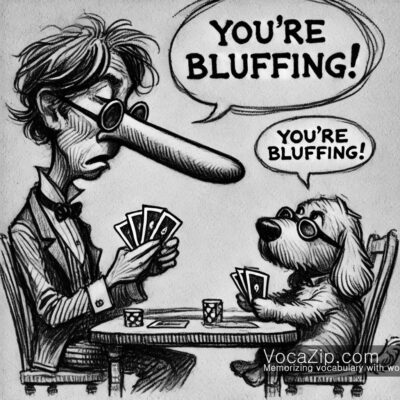deceive meaning
deceive :
Engañar, hacer creer algo falso
Verbo
▪ He tried to deceive his friends.
▪ Intentó engañar a sus amigos.
▪ The magician deceives the audience.
▪ El mago engaña al público.
paraphrasing
▪ mislead – engañar
▪ trick – engañar
▪ fool – engañar
▪ betray – traicionar

Pronunciation
deceive [dɪˈsiːv]
El verbo tiene el acento en la segunda sílaba "ceive", y se pronuncia como "di-sív".
Common phrases and grammar about deceive
deceive - Common meaningn
Verbo
Engañar, hacer creer algo falso
Part of Speech Changes for deceive
▪ deception (sustantivo) – engaño
▪ deceptive (adjetivo) – engañoso
▪ deceiver (sustantivo) – engañador
Common Expressions with deceive
▪ deceive someone – engañar a alguien
▪ deceive the public – engañar al público
▪ deceive oneself – engañarse a sí mismo
▪ deceive by appearance – engañar por la apariencia
Important examples of deceive in TOEIC
Vocabulary examples from the TOEIC test
En las preguntas de vocabulario del TOEIC, "deceive" se utiliza principalmente en contextos que implican engaño o falsedad.
Ejemplo de palabra fácilmente confundible: perceive (percibir)
‘perceive’ significa “percibir” o “darse cuenta” y no tiene connotaciones de engaño. En este contexto, “perceive” no tiene sentido porque no implica falsedad. Por lo tanto, ‘deceive’ es la opción adecuada.
Grammar examples from the TOEIC test
"Deceive" se utiliza como verbo transitivo y aparece en preguntas gramaticales donde se requiere un objeto directo.
deceive
Idioms and fixed expressions in TOEIC
"deceive oneself" significa "engañarse a sí mismo" y se usa cuando alguien se niega a aceptar la verdad.
"deceive the eye" significa "engañar a la vista" y se usa cuando algo parece diferente de lo que realmente es.
Differences between similar words and deceive
deceive
,
mislead
differences
"Deceive" implica un engaño intencional, mientras que "mislead" puede ser accidental o intencional, pero se centra en llevar a alguien por el camino equivocado.
deceive
,
trick
differences
"Deceive" se refiere a engañar a alguien para que crea algo falso, mientras que "trick" implica usar un truco o artimaña para engañar.
Words with the same origin as deceive
The origin of deceive
"Deceive" proviene del latín "decipere", que significa "engañar" o "burlar", y ha mantenido este significado a lo largo del tiempo.
Word structure
Está compuesto por el prefijo "de" (alejar), la raíz "capere" (tomar), y el sufijo "e" (verbo), por lo que "deceive" tiene la estructura de palabra que significa "tomar lejos".
Words with the same origin
La raíz de "deceive" es "cap" (tomar). Palabras con la misma raíz incluyen "capture" (capturar), "captive" (cautivo), "conceive" (concebir).
Please select an image in the quiz
Previous post and next post


hospitable
1683
friendly, welcoming
adjective ┃
Views 3






